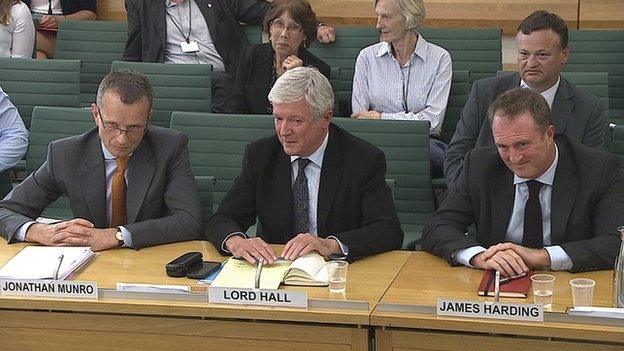Cliff Richard raid: Police accused of 'sheer incompetence'
- Published
David Crompton said the police were put in "a very difficult position"
South Yorkshire Police have been accused of "sheer incompetence" by MPs in the way they dealt with the BBC over a search of Sir Cliff Richard's home.
Police and BBC News were criticised after the corporation was able to send cameras to the pop star's Berkshire home as officers arrived on 14 August.
Chief Constable David Crompton told the Home Affairs Select Committee the force was put in "a very difficult position".
Sir Cliff denies an alleged historical offence of sexual assault in Sheffield.
In a letter to the MPs, Sir Cliff's solicitor Gideon Benaim said: "While there is an ongoing police investigation, we would not wish our client to become embroiled in the wider issues being considered by the committee."
'Perfectly properly'
BBC director general Tony Hall, director of news and current affairs James Harding and head of newsgathering Jonathan Munro also appeared before the committee
Mr Crompton said a BBC reporter, Dan Johnson, had made it very clear that a leak about the investigation had come from the Metropolitan Police's separate Operation Yewtree investigation, which is looking into allegations of historical sexual abuse.
Tony Hall said the chief constable should have raised his concerns with a senior BBC editor
He said the BBC made it clear that it was in a position to publish the story about the allegations against Sir Cliff.
Mr Crompton has previously said the force "reluctantly agreed" to give the reporter prior notice of the raid of Sir Cliff's apartment "in order to dissuade the corporation from publishing details of the investigation".
Mr Crompton told the MPs the subsequent coverage of the search was disproportionate and made the police's actions look heavy handed, which he regretted, but he was confident they made the right decisions in difficult circumstances.
He said he did not go to senior BBC management because he did not have faith that the story would not be published.
'Impeded investigation'
Mr Crompton told the committee: "We were placed in a very difficult position because of the original leak and the BBC came to us knowing everything that we knew, as far as the investigation was concerned.
"My concern was that if we showed the BBC the door, the very clear impression which had been left with my staff in the media department was that they were likely to publish the story. That would have impeded our investigation.
"I'm confident that we made the right decision in difficult and unusual circumstances."

Lord Hall said the BBC's coverage was not disproportionate
Committee chairman Keith Vaz put it to Mr Crompton that the BBC had "blackmailed" him, but he replied: "Blackmail is a very strong word. It put us in a very difficult position."
Mr Vaz told Mr Crompton the committee had been "amazed" by "what appears to be the sheer incompetence with the way in which this matter was dealt with".
Mr Vaz referred to Mr Crompton's "failure to ring up the [Met] commissioner when you heard about Yewtree".
Mr Crompton said the police "had a job to do" but apologised to Sir Cliff "if we were insensitive about the way we did that". Mr Crompton will be recalled to appear before the committee next week.
Aerial photograph
Mr Munro told the committee the reporter "totally denies" mentioning Operation Yewtree or the Metropolitan Police as the source of the story.
He also said police sent Mr Johnson an aerial photograph of Sir Cliff's apartment to help him identify the right location.
Lord Hall said the reporter did not have the story until he went to South Yorkshire Police - and was very careful to say to his bosses at all times "is it ok to broadcast this?"
Lord Hall said: "Had the chief constable come to a news editor, head of newsgathering, James Harding, director of news or myself and said to us, 'If you run this story you will hamper this investigation, it would be damaging to this investigation,' we would not have run the story.
"I want you to be absolutely clear about that. We would not have run the story."
He said Mr Johnson went to South Yorkshire Police to discuss "a number of stories" and had a tip off from a source, which he will not reveal, referring to Sir Cliff.
'Standard practice'
Lord Hall said there was "no hint in any of that of us knowing any more than the name Cliff Richard".
Asked if the BBC was worried its coverage was disproportionate, Lord Hall replied that the "key thing" was the BBC had obtained a statement from Sir Cliff "outlining his position, which I think was extremely clear and extremely robust".
Lord Hall said this was "standard practice for BBC journalists".
Chairman Keith Vaz concluded that, as far as the committee was concerned, the BBC "have acted perfectly properly in respect of this matter".
The BBC has previously confirmed that the original leak did not come from South Yorkshire Police.
The committee was taking evidence on the police, the media and high-profile criminal investigations.
Sir Cliff was questioned under caution last month by South Yorkshire Police but not arrested or charged.
He has said the allegation of an assault at a religious event featuring US preacher Billy Graham at Bramall Lane stadium in Sheffield in 1985 is "completely false".
- Published2 September 2014